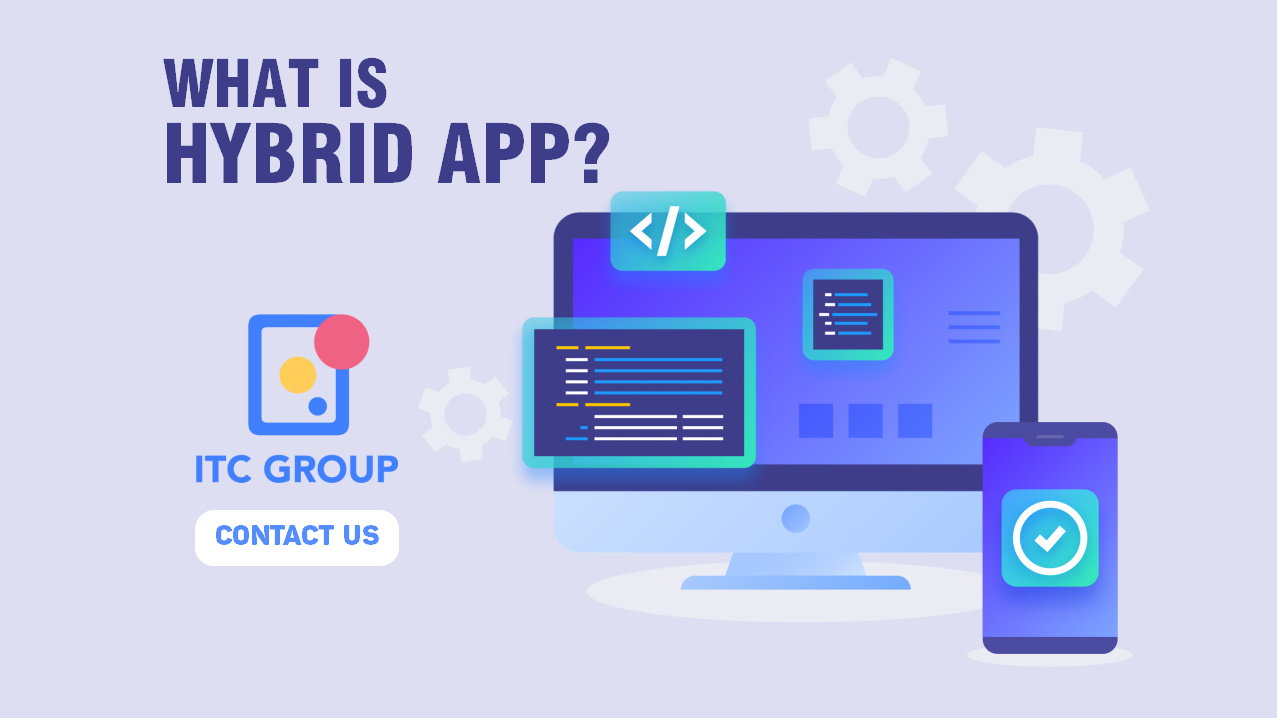








ITC Group - Listen to the article:
What is Hybrid App?
/
00:00
Hybrid apps are one of the best options when choosing a platform for mobile applications. These apps are developed using a popular codebase: HTML5, CSS, and JavaScript. With the help of Hybrid Apps, you can save your day and your company’s budget by creating an app for both Android and iOS platforms with easier maintenance.
In the previous blog, we shared about what a Native App is and React Native development. This type of mobile app development is magnificent, but is React Native is the best choice and the only path for all mobile apps? In this blog, we want to introduce you to Hybrid Apps as another alternative cross-platform development.
Native apps are the software that is developed for a particular Operating System or device. This feature helps the app be faster, fit the specific device, and quality user experience.
React Native is a framework that developers can utilize to code at one time for both IOS and Android platforms.
Read more: React Native: Mobile Development Trend
Hybrid apps are mobile applications or software that are installed on a device, they are likely to be other mobile apps if we do not deep dive into their work and development methods.
What makes a hybrid app different from other apps is its possession of elements from native apps and web apps, websites that work like usual apps but are not installed on a device but through a web browser with an internet connection.
Hybrid apps can act as a web via WebView display thanks to the use of web technologies (HTML, HTML5, CSS, and JavaScript) with the help of special native container platforms. This difference makes it possible for the Hybrid to access most of the functions of the mobile phone’s hardware, including the camera, contacts, accelerometer, audio, etc., which is a limitation of other web apps.
Hybrid apps are popular due to their convenient assembly with React Native because they allow developers to write mobile development code at once but for multiplatform. Thus, it is also a cost-effective choice in comparison with native app development due to its flexibility in choosing a codebase.
A single app for different users
Similar to React Native App, a well-built hybrid app has all the functionalities of a native app but can adapt to different types of Operating systems with a specific codebase. Therefore, this removes the limitation of approaching our customers through digital distribution platforms like Appstore, CH Play,…
Economic burden solving
Due to its possibility to adapt different OS as mentioned above, Hybrid Apps can also save your time and reduce the maintenance cost, which is required in native apps such as updating, repairing, and expanding every time Appstore or CH Play releases their new version.
Reducing development time and costs
By writing code at once, Hybrid Apps helps the IT department decrease the number of developers for developing apps. For example, Objective-C or Swift developers for iOS, Java developers for Android. With Hybrid Apps, we just need a team that can code in some particular programming language that is used frequently by web developers (HTML, JavaScript, and CSS). This creates more chances for web developers and bridges the features of web apps and native apps into one.
We have found out some outstanding benefits of Hybrid Apps, but do Hybrid Apps are the ultimate development path for all business or mobile apps?
The question depends on your business demand, might not be the best development road, but the one that fits your business requirement and status.
So let’s discover some Hybrid App’s cons to see if this development is suitable for your business.
Limited User Interface
Although hybrid apps offer many advantages over web apps, they do have some limitations. One of them is that Hybrid Apps can have a design that doesn’t feel like a “Native App”, which means this platform can not allow us to use various tools built specifically for a particular platform. So with many big brands, they choose to develop Native Apps for a superior User Experience as a way to compete with other companies.
Slower performance
Because hybrid applications are heavy, the performance offered by a hybrid app might be slower than that of native apps in every aspect. However, this degradation depends on the type and size of the application. If your application is small, this is not a noticeable limitation.
Feature set limitation
Despite Hybrid App’s ability to access native device hardware, it is still limited to the Native Apps. Features such as cameras, contacts, sensors, accelerometers, audio, Bluetooth, etc. might not be easy to access and some features might be missing. As a result, users cannot expect remarkable quality and stability when it comes to hybrid apps. Especially for applications with complex features.
Some examples of innovative hybrid apps
Though Hybrid App is not the perfect choice, that doesn’t mean this platform is not suitable. There are many companies that have shown their successful applications thanks to Hybrid App:
Gmail
Gmail is a popular email service. It has millions of downloads. Gmail is not just an email service. It is also a powerful tool that can help you keep track of all your emails. Gmail is a hybrid app. That means it is not just a website. It is also a mobile app. Gmail is a great example of a hybrid app because it has both HTML and native elements.
Evernote
Evernote is a top-notch note-taking app. It is very popular for its elegant design, robust performance with multi-device sync capability, and native-like experience. Evernote’s powerful and flawless functionality is undeniable evidence of the benefits that hybrid apps bring to users.
Apple App Store
The Apple App Store delivers its native content through an HTML5 interface. Unlocking the potential of this base code gives them more flexibility for implementing unlimited features within the app, making it even more successful than it had already been out of the gate. It also makes them one example of many providers that software developers can built on either hybrid or native elements.
Hybrid App is such a cost-effective and ideal development option that it can bring your idea to life. And above all, it’s important to understand your business’s strengths and weaknesses to select your final development direction.
If you are still hesitating about choosing a platform and saving your budget on this process, contact ITC Group. We provide innovative IT consulting services and modern technologies. With skilled and experienced developers who contribute to lots of successful client projects, we hope to consult you on the best Mobile App Development roadmap as well as solutions to improve productivity and outcome. Contact us for more information and consulting!
Stay ahead in a rapidly changing world with our monthly look at the critical challenges confronting businesses on a global scale, sent straight to your inbox.